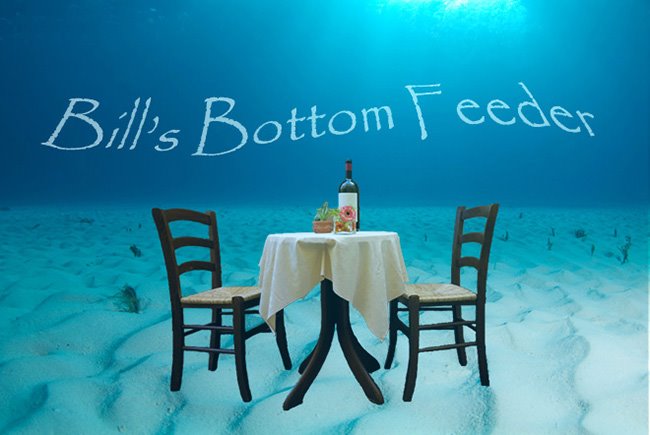Food for thought, or is it thoughts for Food?
As readers should
know by now, I tend to lean toward traditional dishes and cooking, no matter
the cuisine. Foam and molecular
gastronomy are fine, but I prefer dishes that have lasted the test (and taste)
of time. One of (the plethora of) my pet
peeves is when I see the word “classic” used on a menu associated with a particular
dish. In my mind a classic dish is one
that has been made the same way for enough time to set a standard for that
particular preparation, so that's what it should be. A quick example
that leaps to mind would be Sole à La Meunière, or as we commonly see: “Dover Sole”. Ingredients?
Sole, butter, lemons and salt and pepper. That’s it.
No purees, flavored oils, drizzles, just fish and butter. It has been described as: “The perfect (classic?)
sole meunière is golden brown, which is a result of a harmonious balance
between the brown butter and the lemon.”
I would say that if the dish was listed on the menu as “Classic Dover Sole/ Sole à La Meunière”,
you should know exactly what you are
going to get served. So I am always wary
of the (over) use of the word.
A case in point: I
was at a local restaurant and there was menu entry for a “Classic Iceberg Wedge”
salad. But the description of the dish
included such things as green peas, garlic croutons, baby carrots, crumbled Feta
cheese, and (gasp) ranch dressing!. You
can google the recipe and you will find that all of those things do NOT belong
on any wedge with Classic in the name.
Fortunately they honored the feeders note and it has been changed eliminating the "c" word..
Another instance of my paranoia resulted in a very interesting and on-going
conversation with a restaurateur regarding “classic”. Their sandwich was offered as a Classic Reuben
Sandwich, and included marbled rye bread. As an aside, I am do not like marbled rye (or most anything marbled for that matter) so I am biased. The rest of the sandwich was indeed classic (corned beef, sauerkraut, Swiss cheese, and thousand island dressing), but I allowed as how using marbled rye should erase the “classic” designation. (The Reuben is such a classic
American sandwich that two people claim to have invented it: Reuben Kulakofsky
of Omaha, NE, who enjoyed the sandwich at a weekly poker game, and New York
deli owner Arthur Reuben, who said he first made the sandwich around 1914). In order to prove my point I did some
research on recipes for “Classic Reuben’s” and did indeed find a minority did
use a marbled rye, so I backed off some.
I still think the original (1914?) sandwich would have been with straight rye
(and we won’t argue caraway seeds).
Anyway, we did have a good e-discussion on “classic”. It was pointed out to me when does “classic” become “classic”? Rock music from when I was not in my first
year is now called “classic”. How long
does it take to achieve that status? My restaurant
friend said they had been making the sandwich with marbled rye for 20
years. Does that qualify? My retort was then to name the sandwich “Our
Classic Reuben….”.
Anyway, it is a good discussion to have over a glass of
(Classic?) Bordeaux or Burgundy perhaps..
As part of poking around trying to define the word, I found
a few quotes that are interesting (a lot come from literature) such as:
A classic is a work
which constantly generates a pulviscular cloud of critical discourse around it,
but which always shakes the particles off
More of a food
related one surfaced from some writing about Julia:
To Julia, a classic would be a master recipe that
utilized time-honored techniques. Once these were understood and mastered, the
techniques could be allied to an infinite number of dishes that were
essentially variations on the theme. In fact, she went as far as to say that
once these essential recipes and techniques were imprinted on our brains, we
wouldn’t even need a cookbook. We could do anything.
If I had to
generate my own description of a classic dish, it would be along the lines of
something that has been prepared the same way, with the same ingredients by a
series of highly esteemed chefs ( such as Auguste Escoffier; Fernand Point; Marie
Antoine (Antonin) Carême; or more
recently Alain Ducasse; Paul Bocuse) without alteration over a long period of
time. No modifications because it is
beautiful and speaks for itself. Fish,
butter, lemon.
And finally just because I liked it a quote from Voltaire
(again literature based):
"Let us enjoy,
let us write, let us live, my dear Horace! ... I have lived longer than you: my
verse will not last so long. But on the brink of the tomb I shall make it my
chief care - to follow the lessons of your philosophy - to despise death in
enjoying life - to read your writings full of charm and good sense - as we
drink an old wine which revives our senses."
So if you are going to eat a classic dish you damn well better be
DFD

No comments:
Post a Comment